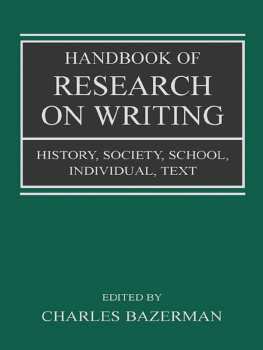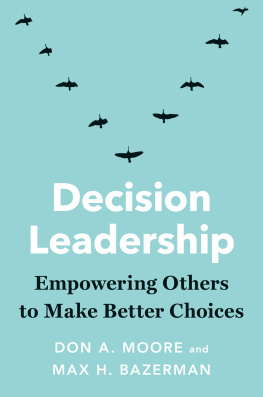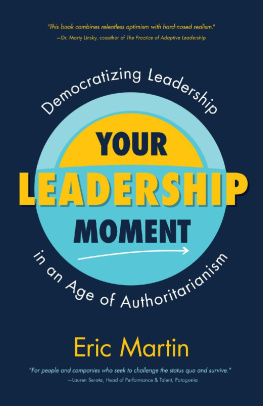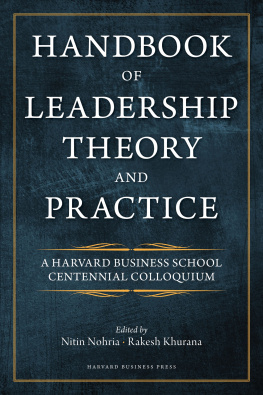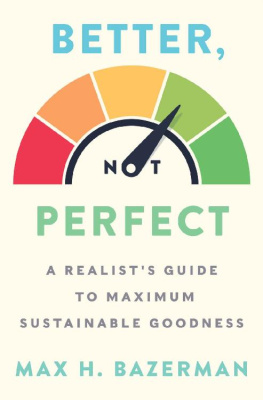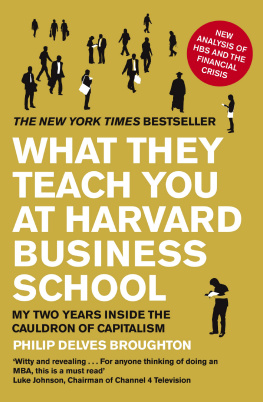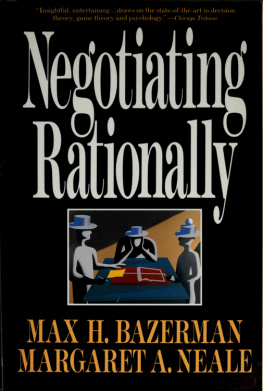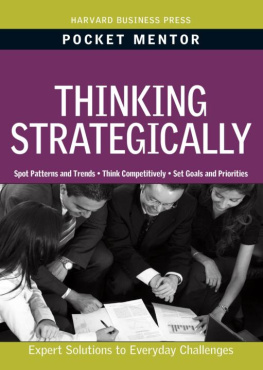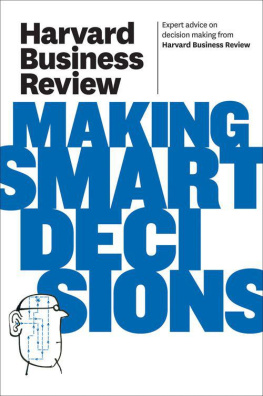
Simon & Schuster
1230 Avenue of the Americas
New York, NY 10020
www.SimonandSchuster.com
Copyright 2014 by Max H. Bazerman
All rights reserved, including the right to reproduce this book or portions thereof in any form whatsoever. For information address Simon & Schuster Subsidiary Rights Department, 1230 Avenue of the Americas, New York, NY 10020.
First Simon & Schuster hardcover edition August 2014
SIMON & SCHUSTER and colophon are registered trademarks of Simon & Schuster, Inc.
The Simon & Schuster Speakers Bureau can bring authors to your live event. For more information or to book an event, contact the Simon & Schuster Speakers Bureau at 1-866-248-3049 or visit our website at www.simonspeakers.com.
Interior design by Akasha Archer
Jacket design by Jason Heuer
Library of Congress Cataloging-in-Publication Data is available.
ISBN 978-1-4767-0029-8
ISBN 978-1-4767-0031-1 (ebook)
Contents
Acknowledgments
This book documents my journey to try to become a first-class noticer. I am not sure that I am there yet, but I am confident that I have made progress in that direction during the current millennium. I have had lots of coaches along the way. They include Dick Balzer, Mahzarin Banaji, Patti Bellinger, Warren Bennis, Iris Bohnet, Dolly Chugh (more on Dolly below), Netta Barak Corren, Marla Felcher, Pinar Fletcher, David Gergen, Francesca Gino, Josh Greene, Karim Kassam, George Loewenstein, David Messick, Katy Milkman, Don Moore, Neeru Paharia, Todd Rogers, Ovul Sezer, Katie Shonk, Lisa Shu, Ann Tenbrunsel, Chia-Jung Tsay, Ting Zhang, and other coauthors and friends whom I am forgetting to notice in the current moment.
My research has been supported by the Harvard Business School since 1998. The academic atmosphere of the Negotiation, Organizations, and Markets unit of the school, as well as the excellent doctoral students I have worked with during this time, have been an enormous source of intellectual insight during my noticing journey. More recently, I also became the codirector, with David Gergen, of the Center for Public Leadership at the Harvard Kennedy School. For me, this leadership position became my most salient experience in thinking about noticing as a critical leadership skill. Directing the center with David and Executive Director Patti Bellinger has provided me with insight, sympathy, and enthusiasm for developing the concept of noticing as a core leadership challenge. It is striking for me to witness how David and Patti, effective leaders and first-class noticers, see things that I have missed. It also seems noteworthy to me that Warren Bennis, the longtime chair of the advisory board of the Center for Public Leadership, was the first to apply the term first-class noticer to the leadership context.
The quality of the writing of this book is dramatically better than what I could have produced on my own. I long ago noticed that many people create far better sentences than I do, and I have benefitted from their help. Katie Shonk has been my research assistant, coauthor, and editor for most of the last two decades. Katie makes each and every sentence I draft better. In addition, she added her noticing skills to this current effort: Hedy Weiss, of the Chicago Sun-Times , in her review of Katies novel Happy Now? , refers to Katie as a first-class noticer. Elizabeth Sweeny, my faculty assistant at the Harvard Business School, has read and edited this book a couple of times along the way, improving the clarity and insightfully questioning my presentation of information, often demanding an extra citation to keep me honest. Thomas LeBien, vice-president and senior editor at Simon & Schuster and the editor of this book, provided detailed editing, coaching, and insight throughout the process. The book has a more logical structure and greater clarity thanks to Thomass many insights. I have published a number of books before this one, and Thomas is easily the most insightful editor I have encountered.
And then there is Dolly Chugh, to whom this book is dedicated. I met Dolly when she was admitted to the Organizational Behavior doctoral program in 2001. For the next five years, Dolly was my most valued colleague. Most of the research I have conducted during the last twelve years would not have been on my radar screen if Dolly had decided to attend a different doctoral program. During her five years at Harvard, Dolly and I developed, with Mahzarin Banaji, the concept of bounded ethicality (Mahzarin originally coined the term in a 2000 article with R. Bhaskar). Dolly received her doctorate from Harvard in 2006 and took a tenure-track faculty position at NYU. My work with Dolly and Mahzarin provided core ingredients to Blind Spots (Princeton University Press), a book I published with Ann Tenbrunsel in 2011. We had asked Dolly to join us as a coauthor on that book; she declined due to her need to focus on journal publications as an untenured professor. Dolly and I also coined the term bounded awareness, which identifies the primary challenges to noticing that are detailed in this book. Once again, I asked Dolly to be my coauthor, and again she declined due to her need to publish in academic journals. I am hopeful for a more positive response on my next book project. Finally, one more thing: like so many other people around me, including David Gergen, Patti Bellinger, Katie Shonk, and Marla Felcher (my spouse, whom you will read about multiple times in this book), Dolly is a first-class noticer!
Max H. Bazerman
December 2013
Preface
Noticing: A Personal Journey
How many times can a man turn his head,
and pretend that he just doesnt see?
BOB DYLAN, BLOWIN IN THE WIND
During the first few nights after 9/11, I awoke abruptly with an image of the second airplane veering into the second tower. Even given the magnitude of the tragedy, this was strange for me. The stress of life seldom disrupts my rest; I normally sleep well and rarely remember my dreams. Now I was waking up with the same frightening image many nights in a row, and I couldnt fall back to sleepagain, rare for me. So I gave up, headed to my home office in the wee hours, and thought about what social scientists like me know about what had just happened to the United States. After a few nights of this pattern, I had a vague notion that 9/11 should have been anticipatedand prevented. Here are the core pieces of evidence I jotted down during those early mornings:
The U.S. government knew that terrorists were willing to become martyrs for their cause and that their hatred toward the United States was increasing.
In 1993 terrorists had bombed the World Trade Center.
In 1994 terrorists had hijacked an Air France plane and made an aborted attempt to turn the plane into a missile aimed at the Eiffel Tower.
Also in 1994 terrorists had attempted to simultaneously hijack twelve U.S. commercial airplanes in Asia.
Airline passengers know how easy it is to board an airplane with items, such as small knives, that can be used as weapons.
Soon after collecting these thoughts, I was having coffee with Michael Watkins, then my Harvard Business School colleague, and mentioned my analysis of 9/11. Michael asked me to follow him into his office, where he pulled out a file labeled Predictable Surprises, which became the title of our 2003 book. This work focused on how individuals and organizations can learn to recognize, prioritize, and mobilize action to avoid serious predictable surprises. In the chapter of our book that analyzed 9/11 as a predictable surprise, we anticipated the eventual conclusion of the 9/11 Commission: The 9/11 attacks were a shock, but they should not have come as a surprise.


